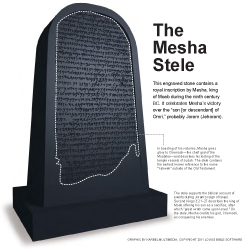2:1 For three transgressions of Moab and for four See note on Amos 1:3.
Moab Judah’s neighbor in the Transjordan, east of the Dead Sea and south of Ammon. See Jer 48:1–47 and note.
burned to lime the bones of Moab will be judged not for offenses against Israel or Judah but for desecrating the corpse of an Edomite king, implying judgment is based on some universal ethic of divine justice. Edom was Moab’s neighbor to the south.
2:2 Kerioth An uncertain location in Moab, also mentioned in Jer 48:24. The Hebrew term used here means “cities.”
2:4–5 The accusations now move closer to home with a condemnation of Judah. The indictment against Judah has a different tone than those focused on the nations. The earlier condemnations emphasized offenses on an international scale, invading and enslaving neighboring peoples. The condemnation of Judah centers on their rejection of Yahweh’s law, a concept developed in the covenant language of Leviticus, Deuteronomy, and the Deuteronomistic History |
2:4 Judah Referring to the southern Israelite kingdom whose capital was Jerusalem. See note on Gen 49:8.
have rejected the law of Yahweh A common indictment in the Prophets. Compare Isa 24:5; 42:24; Jer 6:19; 44:10.
2:5 I will send a fire against Judah Compare Hos 8:14.
2:6–16 The real target of Amos’ critique finally comes into focus with a denunciation of Israel using the same formulaic indictment as before. The initial accusation in Amos 2:6–8 focuses on acts of social injustice—exploitation of the poor and needy. The oracle then expands by recounting Yahweh’s provision for Israel in the exodus and conquest. Their rejection of Yahweh’s caring guidance will result in judgment through a disastrous military defeat. |
2:6 they sell the righteous for money Refers to debt slavery. The parallel with “sandals” suggests the indebtedness was not very great in proportion to the punishment (compare the Parable of the Unforgiving Servant in Matt 18:21–35).
2:7 have sexual relations with the same girl The offense may be the exploitation of the girl or may allude to laws about incest (Lev 18:6–18; 20:12).
they profane my holy name The injustice of His people and lack of concern in following Yahweh’s standards reflects poorly on His character or reputation. On “name” in the sense of “reputation,” see note on Isa 48:19.
2:8 clothing taken in pledge Referring to the practice of taking a garment as security for a loan. That they were lying on these garments likely points to a violation of the biblical law (Exod 22:26–27). A garment taken in pledge was not to be kept overnight.
wine, bought with fines imposed Refers to wine provided as payment for a fine.
in the house of their God Probably refers to idolatrous shrines. The Hebrew phrase used here can be read as “their God” or “their gods.”
2:9 Amorite The name is frequently used in the ot to refer to the inhabitants of the land of Canaan before Israel’s conquest (Gen 15:19–21). Israel faced opposition from two Amorite kings in the Transjordan; they defeated the kings Sihon
kings in the Transjordan; they defeated the kings Sihon and Og
and Og (Num 21:21–35; Deut 3).
(Num 21:21–35; Deut 3).
as tall as cedars Alluding to the tradition that giants were among the Canaanites and Amorites before the Israelite conquest (Num 13:32–33; Deut 3:1–11; compare note on Ge 6:4).
2:10 from the land of Egypt Alludes to the exodus as the prime example of Yahweh’s commitment to save his people. Yahweh emphasizes His active role in bringing Israel out of Egypt and into the land (compare Exod 12:17).
I led you in the wilderness forty years See Deut 8:2.
to take possession of the land of the Amorite See Num 21:25.
2:11 I raised up some of your sons Yahweh continually raised up prophets to call Israel to repentance. Compare Jer 7:25 and note.
Nazirites People set apart for God through a vow (see Num 6:1–21 and note). The Nazirite was dedicated to divine service for a temporary period of time.
2:12 you made the Nazirites drink wine Violating the prohibition in Num 6:3.
You shall not prophesy Compare Isa 30:10.
2:14 the warrior The Hebrew word used here, gibbor, refers to a powerful warrior. See note on 1 Chr 26:6. The imagery here is one of military defeat. Israel fell to Assyria in 722 bc.
in 722 bc.
2:16 on that day Referring to the Day of Yahweh. See note on Joel 1:15.

|
About Faithlife Study BibleFaithlife Study Bible (FSB) is your guide to the ancient world of the Old and New Testaments, with study notes and articles that draw from a wide range of academic research. FSB helps you learn how to think about interpretation methods and issues so that you can gain a deeper understanding of the text. |
| Copyright |
Copyright 2012 Logos Bible Software. |
| Support Info | fsb |
 Loading…
Loading…


